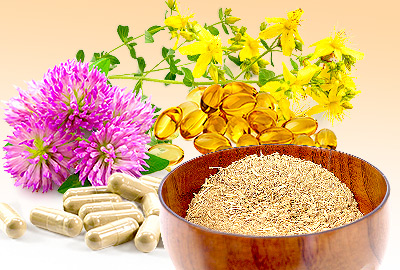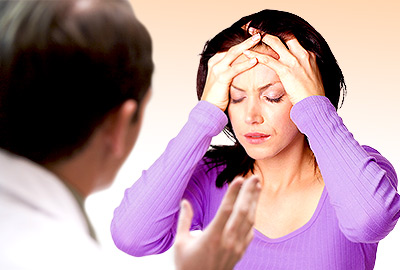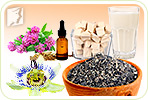For many menopausal women, the aftermath of their anxiety is quite debilitating, negatively affecting their health and quality of life. Fortunately, there is hope for restoring emotional stability and peace of mind as anxiety disorders are highly treatable, granted women choose adequate treatments and approach the process committed and strong-willed.
Continue reading to learn more about anxiety treatments that will help you regain control over your emotional health and give you concrete tools to feel empowered during perimenopause and beyond!
Three Approaches to Treating Anxiety
Women seeking anxiety treatment can choose from among three approaches: (1) Lifestyle changes, (2) Alternative medicine, and (3) Medications. They are recommended to begin with the least risky options and proceed to more conventional, and often riskier, treatments only if necessary.
Lifestyle Changes for Anxiety Treatment

The first level of treatment consists of making healthier lifestyle adjustments, which carries the least amount of risk, but demands the most perseverance. Nevertheless, it can bring tremendous benefits in treating anxiety.
Nutritious Diet
A woman's diet not only affects her physical health, but also emotional well-being. To improve energy, boost mood, promote hormonal balance, and treat anxiety, she is advised to build her diet around three macronutrients - lean protein, healthy fats, and complex carbs - that are rich in essential vitamins and minerals, including the following:
- Phytoestrogens exert weak estrogenic effects in the body, which can help reduce anxiety, depression, and other menopause symptoms by promoting hormonal balance.1
Soy, flax, oats, cabbage, sesame, oats
- Magnesium helps regulate the function of neurotransmitters, like serotonin, which control mood. Its deficiency has been shown to increase the risk of developing anxiety-related behaviors and depression.2
Spinach, avocado, leafy greens, nuts, seeds
- Zinc in a nutrient needed for proper brain function, including stress management and mood regulation. Its low levels have been linked to anxiety as well as other mental health disorders, like depression. 3
Pumpkin seeds, eggs, cashews, oysters, asparagus
- Omega-3 fatty acids have shown to help regulate mood-controlling neurotransmitters, reduce inflammation, and ease anxiety symptoms.4
Salmon, sacha inchi, walnuts, olive oil, flax
Regular Exercise
The effects of regular physical activity on mental health are bountiful. It not only help release stress and promote relaxation, but also improve mood and overall outlook on life. In fact, exercise has been shown as effective as antidepressant medication for treating mild to moderate anxiety and depression.5
Amount: Women are advised to exercise moderately for 30 minutes a day, most days a week, or vigorously for 15 minutes a day, five times a week.6
Type: While it is always best to practice sports that one enjoys, a good idea is to complement one's anxiety treatment workout routines with aerobic and muscle-strengthening exercises.
Useful tips: Weather permitting, women are encouraged to include several exercise sessions outdoors in their treatment plan for anxiety to take advantage of natural boosting effects of sunlight on mood.
Precautions: Due to a higher risk of osteoporosis in menopausal women, sports that have an increased risk of injury or are strenuous should be avoided to prevent fractures.
Wholesome Habits
On top of a healthy diet and exercise, it is worth implementing wholesome habits aimed at relaxing the mind and generating good, positive feelings. Some of the best recommendations for anxiety treatment are as follows:
Relieving stress through meditation, visualization, aromatherapy, and slow, diaphragmatic breathing can strengthen the mind and help it manage thoughts and tasks at hand in a more controlled, productive way.
Maintaining a healthy sleep schedule is an essential part of treating anxiety, especially since both disorders are known to co-exist. Studies have shown that most adults need seven to nine hours of sleep every night.7
Brewing herbal infusions of relaxation-inducing herbs, like valerian or chamomile, can help quiet the mind and decrease anxiety attacks during menopause.
Engaging in a hobby, such as photography or dancing, can help distract the mind from anxious thoughts, promote relaxation, and increase overall emotional well-being.
- Controlling addictions to substances, like nicotine and caffeine, that are known to worsen anxiety symptoms is key for lasting results.8,9
Alternative Medicine for Anxiety Treatment

Alternative approaches to how to treat anxiety encompass a wide variety of options, of which the most popular ones are herbal supplements. They are not only the easiest regimens to follow, but some of the most effective ones since they address the underlying root of menopausal anxiety, hormonal imbalance.
There are two types of herbal supplements that women seeking to treat anxiety can benefit from: phytoestrogenic and hormone-regulating supplements.
Phytoestrogenic Supplements
Phytoestrogenic supplements, like St. John's wort, are rich in phytoestrogens, which are plant-based compounds that function like estrogen in the body. In the short-term, they can replenish estrogen levels and relieve anxiety symptoms. However, their extended use is not recommended because they can make the body less capable of producing its own hormones, thus eventually leading to a further state of imbalance.
Hormone-Regulating Herbal Supplements
Hormone-regulating supplements, like Macafem, do not supply the body with outside hormones. Rather, they contain beneficial compounds that stimulate the body's endocrine glands to improve their own hormone production, thus reducing the symptoms of an imbalance. They are considered one of the safest and most effective menopausal anxiety treatments that can be taken long-term for optimal results.
From Nature and Health Magazine, Dr. Chacon says:
"Macafem's nutrients help restore natural hormones in women. Unlike hormone drugs, which are basically resumed in taking synthetic hormones, Macafem acts totally different in your body. It nourishes and stimulates your own natural hormone production by inducing the optimal functioning of the pituitary and endocrine glands." Click on the following link if you wantto learn more about Macafem.Combining lifestyle adjustments with herbal supplements is often the most holistic and lasting approach to restoring hormonal balance and treating anxiety during menopause. However, women with severe anxiety attacks might need a more conventional treatment, including medications and psychotherapy.
Medications & Psychotherapy for Anxiety Treatment

Anxiety treatments on the third level generally involve the highest cost and some may come with high risks of side effects. However, they are an important and effective option for women whose anxiety negatively impacts their health and quality of life.
There are two types of conventional anxiety treatments that can be considered: medications and psychotherapy.
Psychotherapy
Psychotherapeutic options for generalized anxiety disorder treatment can be highly beneficial, although they do require a significant time commitment. They are usually recommended before prescription medications and come in two main types:
Cognitive-behavioral therapy (CBT) is the most common and effective anxiety therapy. It aims to break negative thought cycles and replace them with more constructive ones.
Applied relaxation therapy consists of learning - under the guidance of a licensed therapist - various coping techniques to relax one's muscles during anxiety attacks and lessen the symptoms.
Medications
Anxiolytics, or anti-anxiety medications, are usually prescribed when psychotherapy has not brought the desired results. They can also be used inconjunction with psychotherapy. The majority work by alleviating anxiety symptoms, not treating the underlying cause.
Antidepressants, most commonly selective serotonin reuptake inhibitors (SSRIs), work by modifying brain chemicals to ease anxiety. They are generally the first option prescribed for anxiety treatment.
Anticonvulsants can be prescribed off label to treat anxiety if antidepressants fail to work, though they are designed to treat epilepsy.
Sedatives, or benzodiazepines, might be used short-term in the case of severe anxiety attacks to promote relaxation and relieve physical anxiety symptoms, like muscle tension.
- Hormone-replacement therapy (HRT) - containing estrogen, progesterone, or their combination - used to be the go-to treatment for women with anxiety and other menopausal symptoms. However, because of the side effects and health risks linked to its use - as shown in the studies below - treatments with HRT are evaluated on an individual basis and generally reserved for severe symptoms.
The three levels of anxiety disorder treatment discussed above are not mutually exclusive. Women may find that some approaches might be more beneficial at various stages of the menopausal transition than others. Nevertheless, many opt to combine lifestyle changes with herbal supplements for optimal, risk-free results the natural way.
A Safe Way of Treating Anxiety
Implementing Lifestyle Changes:
- Loading up on foods rich in phytoestrogens, magnesium, zinc, and omegas
- Keeping up with regular exercise for 150 minutes a week
- Practicing stress-relief techniques of yoga or slow, deep breathing
- Maintaining a healthy sleep schedule and engaging in a hobby
And Taking Herbal Supplements:
- Phytoestrogenic herbal supplements, like St. John's wort
- Or natural hormone-regulating supplements, like Macafem
Sources
- Anxiety and Depression Association of America. (n.d.). Anxiety Medication. Retrieved March 17, 2020 from https://adaa.org/finding-help/treatment/medication
- Anxiety and Depression Association of America. (n.d.). Facts & Statistics. Retrieved March 17, 2020 from https://adaa.org/about-adaa/press-room/facts-statistics
- Anxiety and Depression Association of America. (n.d.). What Medications are Used Treat Anxiety Disorders? Retrieved March 17, 2020 from https://adaa.org/learn-from-us/from-the-experts/blog-posts/what-medications-are-used-treat-anxiety-disorders
- Association for Behavioral and Cognitive Therapies. (n.d.). Treatment Options: CBT or Medication. Retrieved March 17, 2020 from http://www.abct.org/Help/?m=mFindHelp&fa=CBT_Or_Medication
- Beyond Blue. (n.d.). Medical treatments for anxiety. Retrieved March 17, 2020 from https://www.beyondblue.org.au/the-facts/anxiety/treatments-for-anxiety/medical-treatments-for-anxiety
- Cognitive Behavioral Therapy. (2014). A Contemporary View of Applied Relaxation for Generalized Anxiety Disorder. Retrieved March 17, 2020 from https://www.ncbi.nlm.nih.gov/pmc/articles/PMC3797858/
- Harvard Health Publishing. (2016). Nutritional strategies to ease anxiety. Retrieved March 17, 2020 from https://www.health.harvard.edu/blog/nutritional-strategies-to-ease-anxiety-201604139441
- Mayo Clinic. (2017). Depression and anxiety: Exercise eases symptoms. Retrieved March 17, 2020 from https://www.mayoclinic.org/diseases-conditions/depression/in-depth/depression-and-exercise/art-20046495
- Mayo Clinic. (2017). Generalized Anxiety Disorder. Retrieved March 17, 2020 from https://www.mayoclinic.org/diseases-conditions/generalized-anxiety-disorder/diagnosis-treatment/drc-20361045
- NHS. (2018). Generalized Anxiety Disorder in Adults: Treatment. Retrieved March 17, 2020 from https://www.nhs.uk/conditions/generalised-anxiety-disorder/treatment/
- Nutrition Journal. (2010). Nutritional and herbal supplements for anxiety and anxiety-related disorders: Systematic review. Retrieved March 17, 2020 from https://www.ncbi.nlm.nih.gov/pmc/articles/PMC2959081/
- University of Michigan. (n.d.). Relaxation Skills for Anxiety. Retrieved March 17, 2020 from https://medicine.umich.edu/sites/default/files/content/downloads/Relaxation-Skills-for-Anxiety.pdf
Footnotes:
- Studies in Natural Products Chemistry. (2018). Phytoestrogens as Potential Therapeutic Agents for the Treatment of Anxiety and Affective Disorders. Retrieved March 17, 2020 from https://www.sciencedirect.com/science/article/pii/B9780444640567000052
- Neuropharmacology. (2012). Magnesium deficiency induces anxiety and HPA axis dysregulation: Modulation by therapeutic drug treatment. Retrieved March 17, 2020 from https://www.ncbi.nlm.nih.gov/pmc/articles/PMC3198864/
- Indian Journal of Pharmacology. (2013). Effects of nano and conventional zinc oxide on anxiety-like behavior in male rats. Retrieved March 17, 2020 from https://www.ncbi.nlm.nih.gov/pubmed/24130388
- Brain Behavior, and Immunity. (2011). Omega-3 supplementation lowers inflammation and anxiety in medical students: a randomized controlled trial. Retrieved March 17, 2020 from https://www.ncbi.nlm.nih.gov/pubmed/21784145
- Disability and rehabilitation. (2015). Exercise therapy improves both mental and physical health in patients with major depression. Retrieved March 17, 2020 from https://www.ncbi.nlm.nih.gov/pubmed/25342564
- American Heart Association. (2018). Recommendations for Physical Activity in Adults and Kids. Retrieved March 17, 2020 from https://www.heart.org/en/healthy-living/fitness/fitness-basics/aha-recs-for-physical-activity-in-adults
- Sleep Foundation. (2015). National Sleep Foundation Recommends New Sleep Times. Retrieved March 17, 2020 from https://www.sleepfoundation.org/press-release/national-sleep-foundation-recommends-new-sleep-times
- American Addiction Centers. (2019). The Connection between Anxiety and Alcohol. Retrieved March 17, 2020 from https://americanaddictioncenters.org/alcoholism-treatment/anxiety
- Smokefree.gov. (n.d.). Anxiety & Smoking. Retrieved March 17, 2020 from https://smokefree.gov/challenges-when-quitting/cravings-triggers/anxiety-smoking
- JAMA. (2002). Risks and benefits of estrogen plus progestin in healthy postmenopausal women: principal results from the Women's Health Initiative randomized controlled trial. Retrieved January 30, 2020 from https://www.ncbi.nlm.nih.gov/pubmed/12117397
- The Lancet. (2019). Type and timing of menopausal hormone therapy and breast cancer risk: individual participant meta-analysis of the worldwide epidemiological evidence. Retrieved January 30, 2020 from https://www.thelancet.com/journals/lancet/article/PIIS0140-6736(19)31709-X/fulltext



